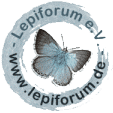1. Lebendfotos
1.1. Falter
2. Diagnose
2.1. Weibchen
2.2. Geschlecht nicht bestimmt
2.3. Ähnliche Arten
2.4. Genitalien
2.4.1. Weibchen
2.5. Erstbeschreibung
3. Biologie
3.1. Nahrung der Raupe
- [Caprifoliaceae:] Knautia arvensis (Acker-Witwenblume)
- [Caprifoliaceae:] Scabiosa ? (Skabiose ?)
- [Caprifoliaceae:] Succisa pratensis ? (Teufelsabbiss ?)
Kennel (1913: 259-260) meldete auf der Grundlage von Angaben aus England: "Die Raupe ist schmutzig grün bis rötlichbraun, Kopf und Nackenschild sind braun. Sie lebt vom August an bis Ende Oktober in Blütenköpfchen von Knautia, auch von Scabiosa."
Razowski (2001: 44) schrieb dann zur Raupe: "B[lüten]k[opf]; Scabiosa, Knautia (Dipsacaceae)." Gut abgesichert ist davon die Angabe zu Knautia arvensis, die Hancock et al. (2015: 75) als einzige Nahrungspflanze aus England nennen.
Eine Nutzung von Scabiosa ist plausibel, eine von Succisa zumindest möglich - konkrete Primärangaben sind mir aber noch nicht bekannt.
(Autor: Erwin Rennwald)
4. Weitere Informationen
4.1. Andere Kombinationen
- Eupoecilia flaviciliana Westwood, 1854 [Originalkombination]
4.2. Faunistik
Die Art wird in Mitteleuropa nur auffallend selten gefunden. Habeler (2014) erläutert seinen Erstnachweis für die Steiermark: "Nationalpark Gesäuse, Scheibenbauerschütt, 750 m, 47°36,3‘ N, 14°43,0‘ E, 20.7.2006, ein Ex. Huemer det. Ein auffallender Fund, denn in Huemer & Tarmann (1993) ist für Österreich nur Nordtirol verzeichnet. Die Raupe lebt nach Razowski (2002) in den Blüten von Scabiosa und Knautia, womit die Lawinenrinne der Scheibenbauerschütt eine weitere besondere Schmetterlings-Art beherbergt."
4.3. Literatur
- Habeler, H. (2014): Lepidopterologische Nachrichten aus der Steiermark, 21 (Lepidoptera). — Joannea Zoologie 13: 165–179. [PDF auf zobodat.at]
- Hancock, E.F., Bland, K.P. & J. Razowski (2015): The moths and butterflies of Great Britain and Ireland. Volume 5 (Part 1). Tortricidae, Tortricinae & Chlidanotinae. - 245 S.; Leiden & Boston (Brill).
- Kennel, J. (1908-1921): Die Palaearktischen Tortriciden. Eine monographische Darstellung. — Zoologica, 21 (54): 1-546. [PDF auf zobodat.at]
- Murria Beltrán, E. (2005): Acleris emargana (Fabricius, 1775), Aethes fennicana adelaidae (Toll, 1955) y Cochylis flaviciliana (Westwood, 1854), nuevas especies para la fauna de España (Lepidoptera: Tortricidae). — SHILAP Revista de lepidopterología 33 (129): 31-37. [PDF auf redalyc.org]
- Razowski, J. (2001): Die Tortriciden (Lepidoptera, Tortricidae) Mitteleuropas. Bestimmung - Verbreitung - Flugstandort - Lebensweise der Raupen. — 319 S.; Bratislava.
- Erstbeschreibung: Westwood, J. O. (1854): Index entomologicus; or, a complete illustrated catalogue, consisting of upwards of two thousand accurately coloured figures of the lepidopterous insects of Great Britain. A new and revised edition, with supplement, containing figures and notices of nearly two hundred newly discovered species, synoptic lists, etc. — 1-298. London (G. Willis).



![Vorkommen in Österreich [Huemer (2013: NR 2445)]](/res/img/flag/at.png)

![Vorkommen in Norwegen (außer Spitzbergen und Jan Mayen) [Aarvik & al. (2017): Nordic-Baltic Checklist]](/res/img/flag/no.gif)
![Vorkommen in Dänemark (außer Färöer-Inseln und Grönland) [Aarvik & al. (2017): Nordic-Baltic Checklist]](/res/img/flag/dk.gif)
![Vorkommen in Schweden [Aarvik & al. (2017): Nordic-Baltic Checklist]](/res/img/flag/se.gif)
![Vorkommen in Finnland (außer Åland-Inseln) [Aarvik & al. (2017): Nordic-Baltic Checklist]](/res/img/flag/fi.gif)
![Vorkommen in Russland (europäischer Teil bis Manytsch-Niederung) [Sinev (2021)]](/res/img/flag/ru.gif)
![Vorkommen in Estland [Aarvik & al. (2017): Nordic-Baltic Checklist]](/res/img/flag/ee.gif)
![Vorkommen in Lettland [Aarvik & al. (2017): Nordic-Baltic Checklist]](/res/img/flag/lv.gif)
![Vorkommen in Litauen [Aarvik & al. (2017): Nordic-Baltic Checklist]](/res/img/flag/lt.gif)
![Vorkommen in Polen [Buszko J. & J. Nowacki [eds] (2017): A Distributional Checklist of the Lepidoptera of Poland]](/res/img/flag/pl.gif)
![Vorkommen in Tschechien [Laštůvka, Z. & J. Liška (2011): Komentovaný seznam motýlů České republiky]](/res/img/flag/cz.gif)

![Vorkommen in Ungarn [Pastorális et. al. (2018): A Magyarországon előforduló molylepke-fajok névjegyzéke]](/res/img/flag/hu.gif)
![Vorkommen in Großbritannien [Agassiz, Beavan & Heckford (2013): Checklist of the Lepidoptera of the British Isles]](/res/img/flag/gb.gif)
![Vorkommen in Irland einschließlich Nordirland [Bond & O'Connor (2012): Checklist of Irish Species]](/res/img/flag/ie.gif)
![Vorkommen in Belgien [De Prins(2016): Catalogus van de Belgische Lepidoptera]](/res/img/flag/be.gif)
![Vorkommen in den Niederlanden [Kuchlein & de Vos (1999): Annotated Checklist of the Dutch Lepidoptera]](/res/img/flag/nl.gif)
![Vorkommen in Luxemburg [Hellers (2002): Die Wickler Luxemburgs]](/res/img/flag/lu.gif)
![Vorkommen in Frankreich (europäisches Territorium ohne Korsika) [Vandromme et al. (2020): Liste systématique et taxinomique des Lépidoptères de France]](/res/img/flag/fr.gif)
![Vorkommen in Spanien (Festland) [Vives Moreno A. (2014)]](/res/img/flag/es.gif)
![Vorkommen in Italien (Festland und kleine festlandsnahe Inseln) [Trematerra (1995): Checklist delle Specie della Fauna Italiana 85]](/res/img/flag/it.gif)
![Vorkommen auf Sardinien [Trematerra (1995): Checklist delle Specie della Fauna Italiana 85]](/res/img/flag/it-sar.png)
![Vorkommen in Sizilien [Trematerra (1995): Checklist delle Specie della Fauna Italiana 85]](/res/img/flag/it-sic.png)
![Vorkommen in Nordmazedonien [Huemer, Krpač, Plössl & Tarmann (2011)]](/res/img/flag/mk.gif)
![Vorkommen in Rumänien [Rákosy L. & M. Goia (2021): Lepidopterle din România: lista sistematică şi distribuţie]](/res/img/flag/ro.gif)

















